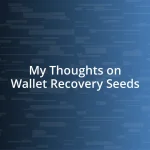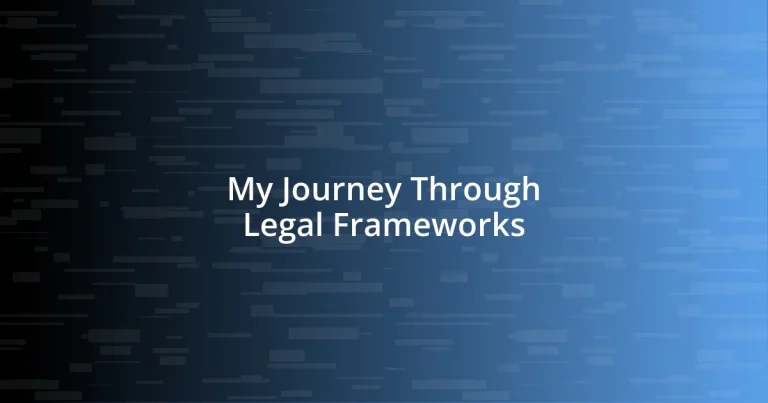Key takeaways:
- Legal frameworks are essential for maintaining order and justice, reflecting societal values and protecting individual rights.
- Navigating legal systems requires attention to detail, continuous learning, and strong communication skills, emphasizing the human impact of law.
- Future trends in legal frameworks include the integration of technology, global legal standards, and a focus on sustainability and ethical considerations.
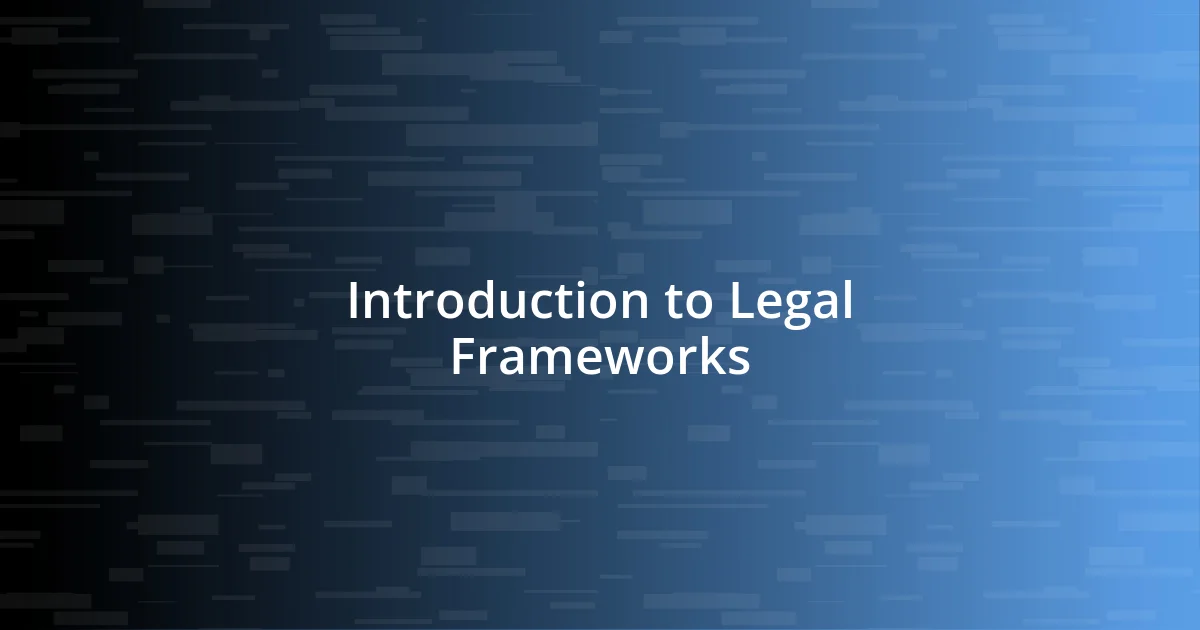
Introduction to Legal Frameworks
Legal frameworks serve as the backbone of our society, delineating the rules and principles that govern our interactions and institutions. I still remember the first time I encountered a legal framework in school; it felt like opening the door to a complex, yet fascinating world where every law had a purpose. Isn’t it amazing how these structures shape the very way we live and engage with one another?
Think about it—without these frameworks, we would lack the clarity and safety that laws provide. When I navigated my first contract negotiation, I realized just how essential legal frameworks are in protecting our rights and ensuring fair dealings. Have you ever wondered what chaos might ensue if everyone operated on their own set of rules?
These frameworks not only govern our behaviors but also reflect our cultural values and societal norms. I often find myself reflecting on how legal systems evolve, often in response to changing social dynamics. This journey through legal frameworks is not just about rules; it’s about understanding the stories and voices embedded within them.
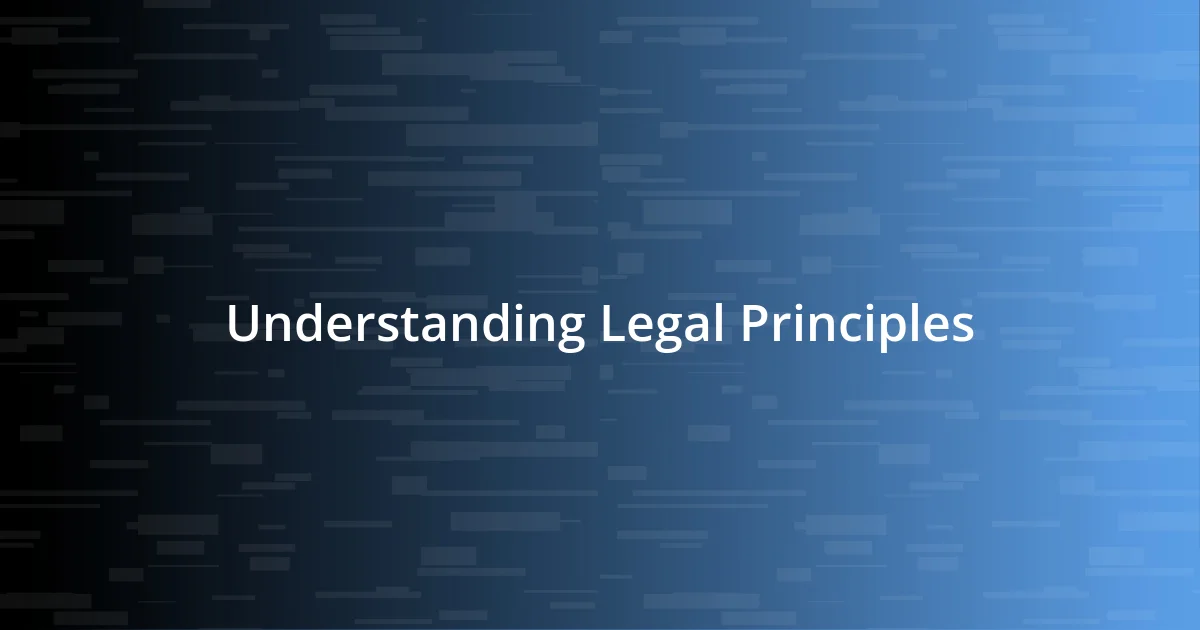
Understanding Legal Principles
Understanding legal principles requires diving into the heart of what law represents and how it affects our daily lives. I vividly recall sitting in my first law class, where the professor passionate about the nuances of justice said, “Law is not just a set of rules; it’s a reflection of our moral beliefs.” That statement resonated deeply with me, highlighting how laws embody societal values and ethics.
As I explored various legal principles, I realized they aren’t just theoretical constructs—they have real-world implications. I remember during an internship, encountering a case where a seemingly minor legal principle, like the duty of care in negligence, transformed the outcome for a family. It was a powerful reminder that understanding these principles can mean the difference between justice and injustice.
In essence, legal principles provide a framework for interpreting our rights and responsibilities. They guide decision-making in courts, influence legislative processes, and shape societal expectations. Reflecting on these principles has enriched my perspective on the importance of law in fostering not just order, but also justice in our communities.
| Legal Principle | Explanation |
|---|---|
| Rule of Law | The principle that every individual and institution is subject to the law, ensuring fairness and accountability. |
| Rights and Duties | A legal framework defining what individuals are entitled to and responsible for within society. |
| Precedent | Legal decision that serves as an authoritative rule in future similar cases, promoting consistency in the legal system. |
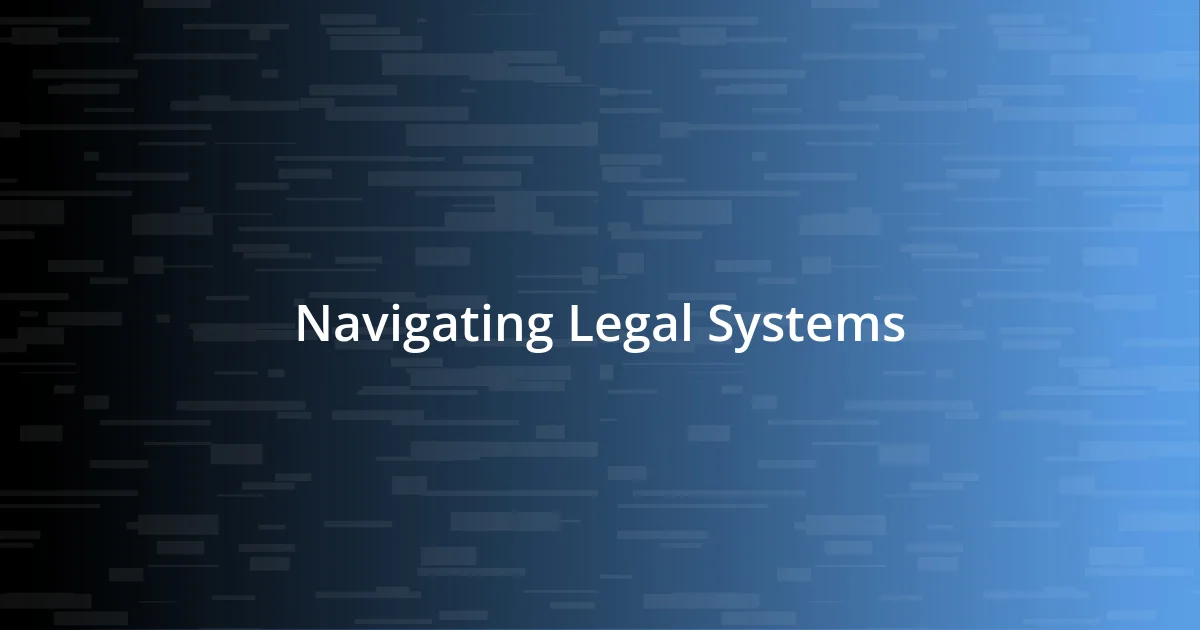
Navigating Legal Systems
When I first stepped into a courtroom, I felt a mix of anxiety and excitement. It struck me how daunting legal systems can be, yet they’re fundamental to upholding justice. Navigating these systems required me to pay close attention to every detail, from filing motions to understanding courtroom protocol. Each interaction was a reminder that the law is anything but static; it’s a living entity shaped by human experience and societal change.
- Familiarize yourself with the local laws: Each jurisdiction can have differing rules that can drastically affect a case.
- Seek mentorship: Connecting with seasoned legal professionals can provide invaluable insights and guidance.
- Stay organized: Keeping track of deadlines and legal documents is crucial to navigating any legal system effectively.
- Embrace continuous learning: The law is ever-evolving, and staying updated on changes can enhance your understanding and effectiveness.
- Build strong communication skills: Whether speaking or drafting documents, clear communication is key in legal contexts.
One experience that stands out for me is the intricate world of family law I encountered while assisting in a case. The emotional weight of the decisions at hand was palpable, reminding me that navigating the legal system often intertwines with people’s deepest fears and hopes. I quickly learned that beyond statutes and regulations, empathy plays a crucial role. Hearing the clients’ personal stories made me appreciate how legal systems can serve as both a beacon of hope and a source of conflict. It’s a delicate dance of understanding the law while being acutely aware of its human impact.
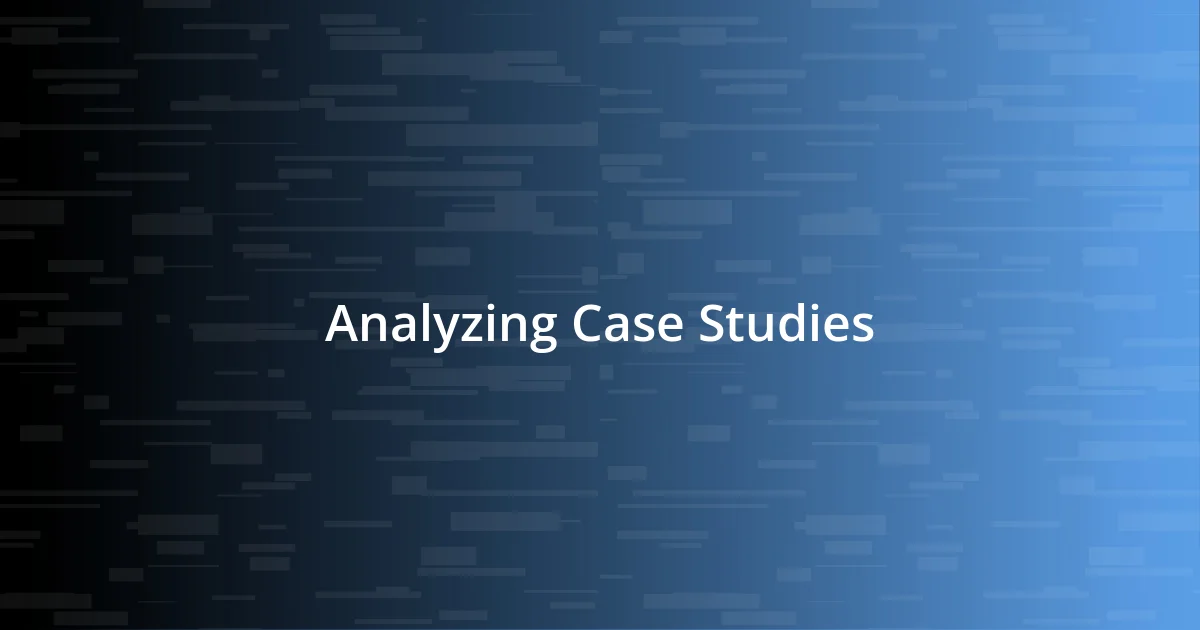
Analyzing Case Studies
In analyzing case studies, I often find myself captivated by the narratives that unfold within legal decisions. Each case tells a unique story shaped by the facts, emotions, and the interplay of legal principles. For example, during a research project, I delved into a landmark discrimination case where the testimony of a single witness transformed the court’s understanding of bias. It made me question—how often do we overlook voices that could change the course of justice?
As I sifted through various case studies, I began to appreciate the nuances in judicial reasoning. I recall examining a tort case that hinged on the concept of foreseeability. The judges wrestled with whether the defendant could have reasonably anticipated the harm caused. This exercise illuminated the complex balance between personal responsibility and societal expectations. Isn’t it fascinating how these legal determinations can redefine each participant’s narrative in such a profound way?
One particular analysis stands out in my memory: it was a case about environmental law that directly impacted a community I was familiar with. The ruling not only set a precedent but sparked a grassroots movement advocating for stronger regulations. This experience led me to reflect on the significance of legal outcomes beyond the courtroom—how they ripple through communities and inspire real change. In my view, analyzing case studies allows us to connect with the human element of law, ultimately making it all the more vital and relatable.
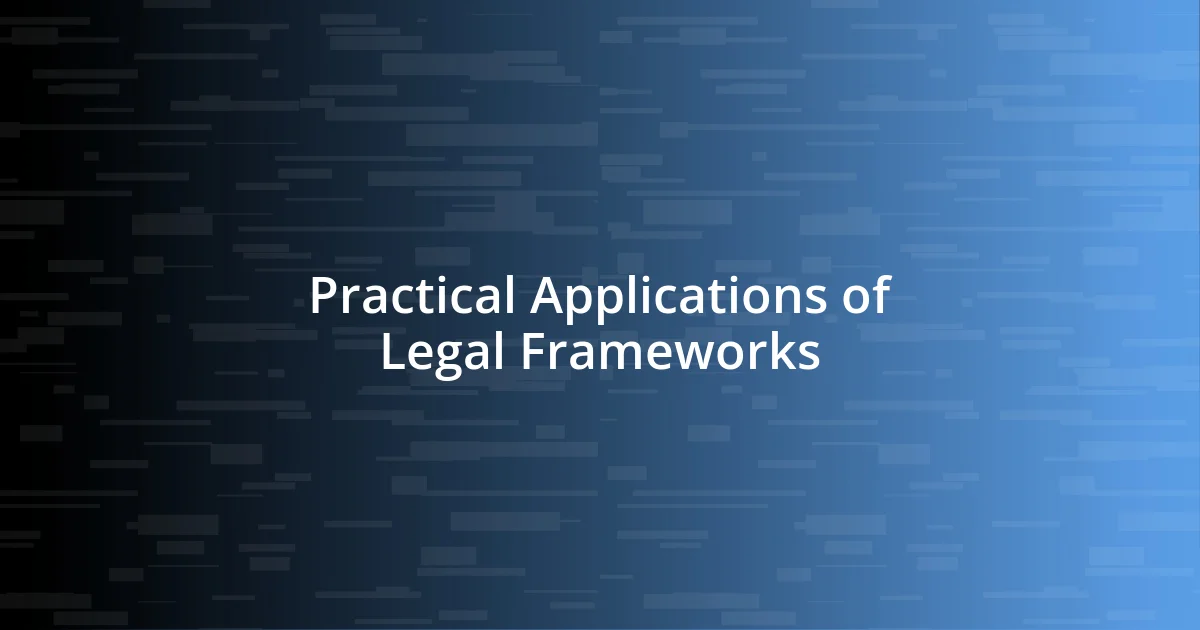
Practical Applications of Legal Frameworks
The practical applications of legal frameworks extend far beyond the courtroom. I remember when I got involved in a community project aimed at improving local housing regulations. Understanding the legal framework allowed us to pinpoint areas needing reform. It was enlightening to see how laws could be wielded to elevate living conditions and protect tenant rights—my perspective on the law shifted when I realized its power in everyday life.
A vivid moment for me was during a negotiation workshop where we practiced mediation skills. It became clear how essential legal frameworks are not just in litigation, but also in conflict resolution. I found myself asking—how often do we underestimate the role of negotiation in legal practice? This experience highlighted that understanding legal statutes and principles can facilitate better communication, helping people reach amicable solutions and avoiding the heavy costs of court battles.
Moreover, I’ve seen firsthand how organizations leverage legal frameworks in compliance efforts. While volunteering for a non-profit, I helped draft policies that aligned with newly implemented regulations. I can still feel the weight of responsibility I felt; getting it right meant protecting vulnerable populations. This taught me that legal frameworks are not just a guideline, but a critical foundation that shapes entire sectors, ensuring they operate fairly and ethically.
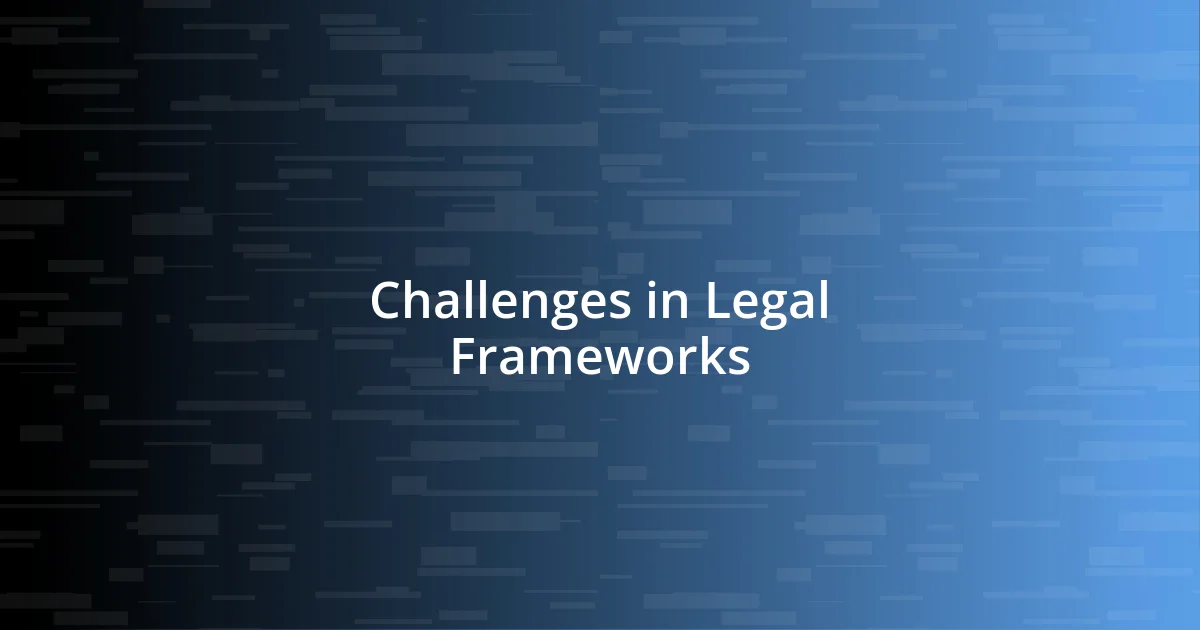
Challenges in Legal Frameworks
Navigating the complexities of legal frameworks can often feel like a formidable challenge. I remember a time when I was tasked with unpacking a convoluted set of regulations for a community initiative. The legal jargon was staggering, making it easy to feel overwhelmed. It prompts me to wonder—how many people shy away from engaging with the law simply because it seems too complicated?
Another aspect that consistently poses a challenge is the dynamic nature of laws. During a recent project focusing on emerging technology, I realized the laws governing digital privacy were evolving just as quickly as the technology itself. This left me pondering how one can remain compliant while the rules keep shifting. It’s a delicate dance, requiring constant vigilance to adapt. That experience highlighted for me just how critical it is to stay informed—not just for compliance, but to genuinely understand the implications these changes have on our society.
Furthermore, I’ve noticed that the gap between legal theory and practice can create significant obstacles. I worked alongside a lawyer who had a wealth of knowledge but struggled to apply it in real-world scenarios. I felt the frustration building as we attempted to translate legal principles into actionable steps. It made me question: why do we often teach laws in isolation rather than in a context that highlights their impact? This disconnect can lead to missed opportunities for meaningful change, both within the legal field and in community engagement.
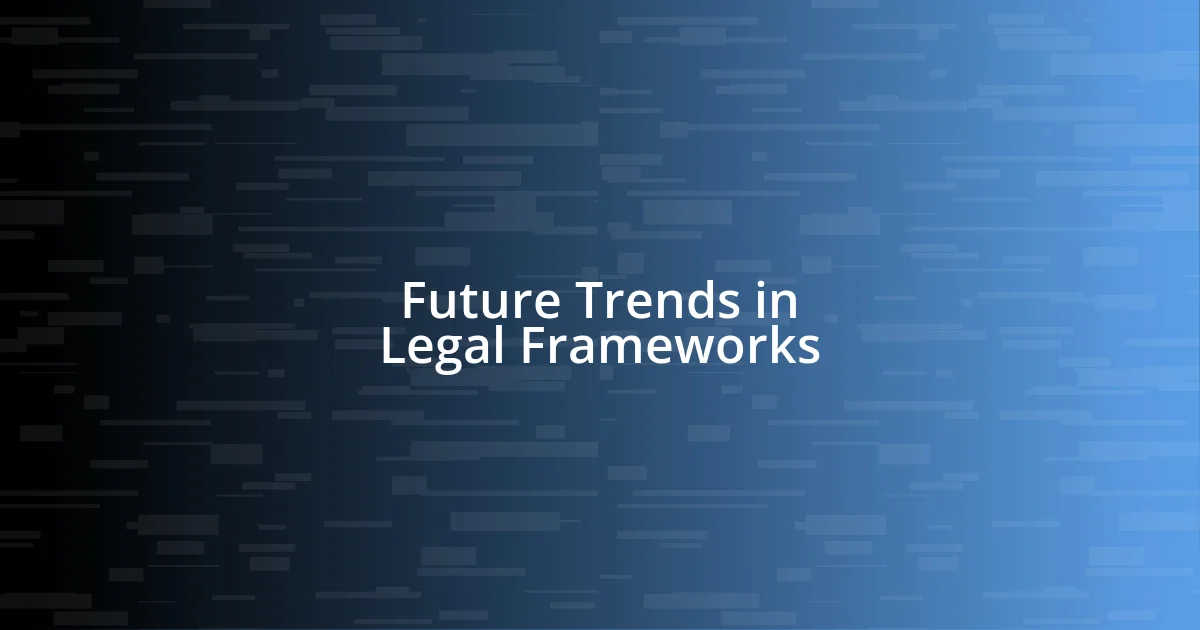
Future Trends in Legal Frameworks
I’ll share some exciting trends that I believe will shape the future of legal frameworks, drawing from my experiences as I navigate this landscape. One trend that’s becoming increasingly evident is the integration of technology in legal processes. I once observed how a legal tech start-up was using artificial intelligence to streamline document review. The efficiency was astounding! It made me think about the future: how could these innovations reduce costs and even make legal advice more accessible for small businesses and individuals? It feels like we’re on the brink of a transformation that could democratize legal services.
Another notable trend is the rise of global legal standards as businesses operate in ever-expanding international markets. I remember participating in a conference where experts discussed cross-border compliance issues. The conversation sparked a realization for me: one local regulation can often have rippling effects globally. I wonder, how equipped are we as legal professionals to tackle these interconnected challenges? I believe this shift will necessitate a collaborative approach, encouraging attorneys to embrace a broader, more holistic view of the law that transcends mere jurisdictional boundaries.
Lastly, the growing emphasis on sustainability and ethical considerations in legal frameworks can’t go unnoticed. Reflecting on my time volunteering with environmental advocacy groups, it dawned on me how laws could protect not just people, but the planet. This leads me to ask—how can legal frameworks evolve to address urgent global issues like climate change? I genuinely hope that future legal practices will incorporate these ethical dimensions, ensuring that the development of laws aligns with the values of sustainability and social responsibility. Emphasizing these themes is not merely a trend—they represent a necessary evolution of our collective conscience in the legal field.








